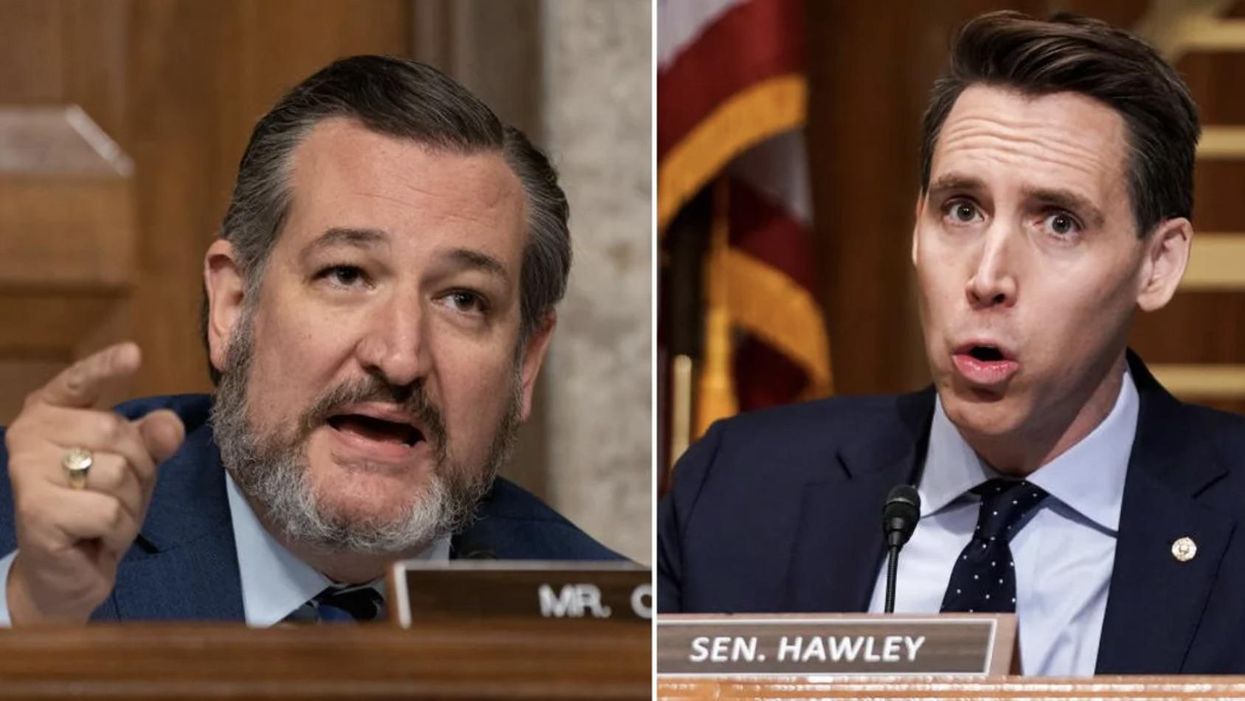
Ken Cedeno-Pool/Getty Images (left), Greg Nash-Pool/Getty Images (right)

Some are questioning the basis of the investigation
Senate Democrats will conduct an investigation into Sens. Ted Cruz (R-Texas) and Josh Hawley (R-Mo.) using what Politico described as "one of the most secretive committees in Congress."
According to Politico, the Senate Ethics Committee will investigate the Republican lawmakers to determine what, if any, role they played in the deadly violence at the U.S. Capitol on Jan. 6.
Prior to the violence, both senators announced they would oppose the certification of Joe Biden's Electoral College victory. A joint session of Congress was meeting to do just that when the Capitol was stormed by Trump supporters who believed the presidency was "stolen" from then-President Donald Trump.
The formal ethics investigation comes after seven Senate Democrats filed an ethics complaint against Cruz and Hawley.
The complaint — filed by Democratic Sens. Sheldon Whitehouse (R.I.), Ron Wyden (Ore.), Tina Smith (N.M.), Richard Blumenthal (Conn.), Mazie Hirono (Hawaii), Tim Kaine (Va.), and Sherrod Brown (Ohio) — claims both Cruz and Hawley "amplified claims of election fraud."
"While Congress was debating Senator Cruz's objection, a violent mob stormed the Capitol. These insurrectionists ransacked the building, stole property, and openly threatened Members of Congress and the Vice President. Dozens of police officers were injured; five people died, including U.S. Capitol Police Officer Brian Sicknick," the complaint adds. "By proceeding with their objections to the electors after the violent attack, Senators Cruz and Hawley lent legitimacy to the mob's cause and made future violence more likely."
The group of Democrats demands that Cruz and Hawley be investigated to determine if they played a role in the coordination of the attack on the Capitol, though zero evidence has surfaced suggesting either Republican was involved in the violence.
"The extent, if any, of communication or coordination between Sens. Hawley and Cruz and the organizers of the rally remains to be investigated," the ethics complaint reads. "Further investigation is necessary to determine whether and to what extent Senators Cruz and Hawley were also aware of these groups' activities or coordinated with their efforts."
The Senate Ethics Committee stays mute about its business until it determines to take action, which means, as Politico noted, the investigation into Cruz and Hawley "will unwind over an interminable timetable with little hint of where it is going."
Kaine said the open-ended process permits the committee to "conduct whatever investigation question we asked that they need to, without a time limit on how they do it. And Cruz and Hawley have to have a fair forum to present their own thoughts about what happened."
Sen. Chris Coons (D-Del.), the chairman of the committee, has called on Cruz and Hawley to resign.
However, not everyone agrees with the nature of the ethics investigation.
Rep. Susan Collins (R-Maine) suggested the probe may be an avenue to punish Cruz and Hawley for merely holding dissenting views.
"It's a very slippery slope if you start punishing senators for holding unpopular views and exercising their rights on the Senate floor," she told Politico. "That's not what I think of the Ethics Committee as being for. I don't see how this is an ethics complaint."
Sen. Dianne Feinstein (D-Calif.) has similarly defended Cruz and Hawley, rebuking calls for the Republicans to resign by citing the nature of Senate dialogue.
"I think the Senate is a place of freedom," Feinstein said last month. "And people come here to speak their piece, and they do, and they provide a kind of leadership. In some cases, it's positive, in some cases, maybe not. A lot of that depends on who's looking and what party they are. But it's an important place to have this kind of dialogue. It's probably the highest-level dialogue that you get in an electoral body."